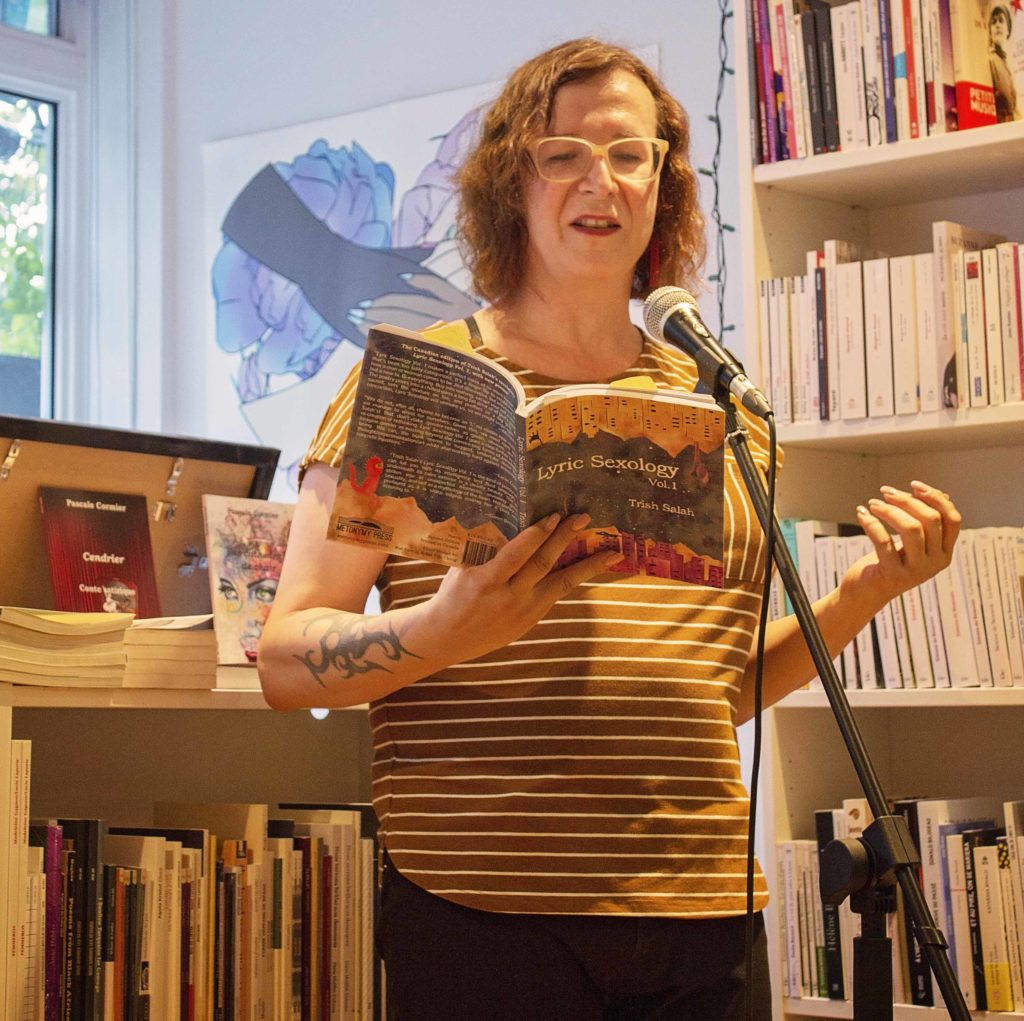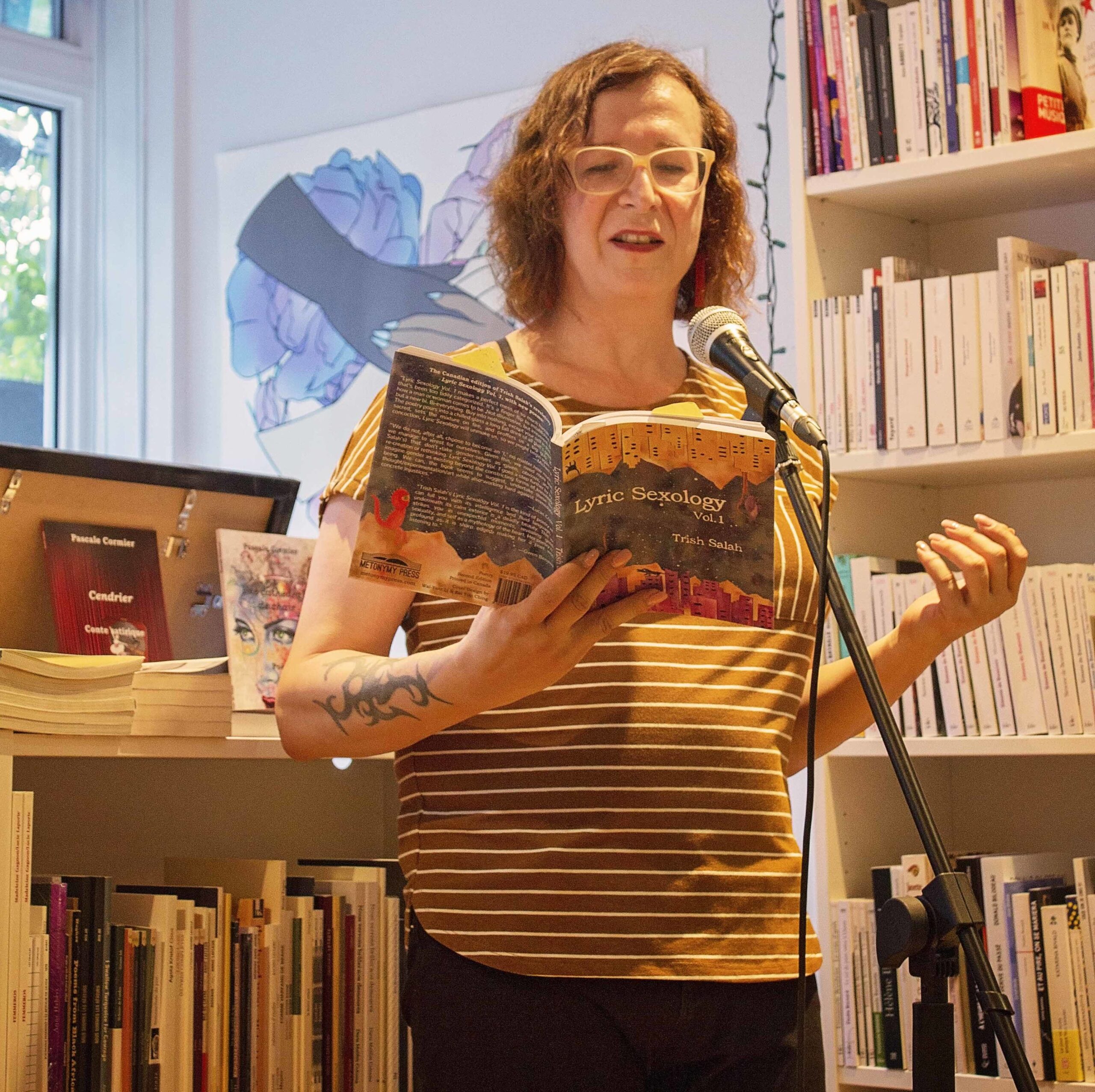 Only days before publishing Lyric Sexology Vol. 1, we sat down with poet Trish Salah to talk with her about the book, her writing process, l’écriture féminine, archives, and women’s bookstores.
Only days before publishing Lyric Sexology Vol. 1, we sat down with poet Trish Salah to talk with her about the book, her writing process, l’écriture féminine, archives, and women’s bookstores.
Among many others, we had been appreciating her work from more of a distance for over a decade, as her first collection of poetry, Wanting in Arabic, was originally published in 2002, and she taught at Concordia University in Montreal for many years.
“That’s the bones of Lyric Sexology—that poetry can be a philosophical argument.”
We asked about the trajectory of her writing and what she’s currently working on, and she pointed to the overlap between creative writing and theory: “I’ve published a lot of articles that sometimes move in poetic ways, and … in Quebec there was this thing called fiction theory at one point, which was about trying to refuse the divide between creative production and theoretical production. … But I was really inspired by l’écriture féminine and fiction theory, and some of my first poems are really actually theoretical arguments as much as they are [poems]. That’s there in Wanting in Arabic, and in some ways that’s the bones of Lyric Sexology—that poetry can be a philosophical argument.”
She also reminded us that she has a story in the Topside anthology of trans sci-fi and fantasy, Meanwhile, Elsewhere, coming out in early September.
What was her process for Lyric Sexology? “One of the inceptions of the book was thinking about gendered rhetorics and how one is in a body in relationship to that.” She said it also started off rooted in her dissertation, “which was to do with archives of representations of transgendered [people]. But [another thing is] I was trying to write a collection of stories about voice … and the ways in which voice changes through transition, and doesn’t change through transition,” Trish said.
“If Wanting in Arabic was in some ways about trying to figure out how I as a subject might inhabit certain histories, Lyric Sexology is about a collective problem of how we might inhabit those histories and struggle with discourses we had a hand in making that we may now find toxic for all sorts of different reasons.”
“I have been lucky in my friendships and in the communities I’ve entered into in such a way that I think my work was received as critical poetry by an Arab queer woman.”
And she’s thought about these things a lot, as it turns out. She took her first course in trans culture and politics from Mirha-Soleil Ross in the late 90s, and then by 2001 was teaching a similar course herself at the Toronto Women’s Bookstore.
What a beautiful trajectory! She expressed a lot of gratitude for the support she’s received: “I have been lucky in my friendships and in the communities I’ve entered into in such a way that I think my work was received as critical poetry by an Arab queer woman.” She also acknowledged the disparities in publishing and writing and teaching, still: “I’ve had mentors, I’ve had good conversations, and a long list of people for whom I’m grateful to be in conversation and dialogue with within that. And on the other hand, we still have massive gender imbalances and racial imbalances in terms of what gets understood to be Canadian literature—so the CanLit conversation about masculinism, racism, and colonialism is entirely relevant.”
Tensions between possibility and the the work still to be done were present throughout our conversation. Regarding her goals for Lyric Sexology itself, she said, “I hoped that by producing a history of representation that at some point trans people had made use of in different ways, some of what seems terrible or impossible about our histories might be … made available rather than appear as something that we would rather not know.”
Trish’s next launch of the book takes place in Ottawa on Saturday, September 16 at 7:30pm. Find out more.
